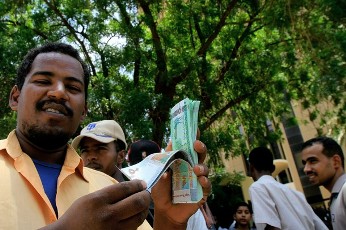Qatar loans Sudan $2 billion amid slipping currency
February 6, 2012 (KHARTOUM) – The government of Qatar is set to loan Sudan USD $2 billion as the country enters a phase of deep economic crisis that was compounded by the secession of the oil rich South less than a year ago.

Qatar was the venue of talks between the Sudanese government and Darfur rebels that ended up with a peace accord.
Al-Thani will seal the loan agreement with Bashir during his visit, Sudanese newspapers reported.
Last Friday, the Sudanese president said that his government is expecting help from friendly nations at a time when the Sudanese pound reached record lows against other major currencies.
As the government lost access to 75% of oil reserves in the south, the influx of hard currency has been severely curtailed forcing the Central Bank to be extra prudent with its available foreign exchange reserves.
For more than a year Khartoum has imposed a wide range of restrictions on individuals and corporations in relation to purchasing and transferring hard currency. Many imports were placed on a black list to cut outflow of forex.
Black market traders told Reuters that the Sudanese pound on Monday hit its lowest point against the dollar since the currency was launched in 2007.
A dollar bought 5.2 Sudanese pounds on Monday, compared to 3.3 in July, dealers said. The official rate is around 3.
Demand for the dollar, and controls on the official exchange rate, have turned the black market rate into a benchmark. Even large companies have started trading money there, meeting dealers in derelict shops to dodge security.
The Sudanese authorities had threatened tough penalties on black market traders but this done little to prevent it from flourishing.
Sudanese citizens, tired after years of wars, inflation and U.S. sanctions, said they are trying to shift savings into dollars, expecting the pound will lose further ground.
“I am transferring my salary and any savings I have into dollars to preserve the value,” said a Sudanese man working in a telecom company who gave his name as Ahmed.
“I even try shifting small amounts. If I don’t do this I lose and lose money,” he said.
In Khartoum’s Afraa shopping mall, four officially sanctioned exchange bureaux, which are forced by the central bank to offer the official rate, were deserted. “We have no customers here, you can see this,” said the head of a large exchange bureau, pointing to his empty shop.
“If I had dollars to change I would go to the black market too,” he said, declining like others to be identified. “Exchange bureaux don’t have enough dollars anyway”. Foreigners working in Sudan struggle to transfer salaries home, even if they are entitled to it.
“It’s difficult,” said a man from Liberia working for the United Nations, while standing in front of a closed money transfer firm.
“You come to an exchange bureau and they tell you ‘We’re not ready’ or they only handle this until 09:30,” he said.
At a foreign money transfer firm, a supervisor said staff was under central bank orders to allow Sudanese to transfer only $150 abroad a week.
“Foreigners need to go to special branches,” he said.
(ST)
